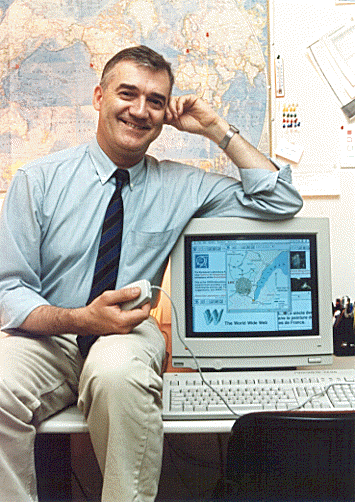
You can find from here:
- Some things about me (very informal) just below;
- My agenda;
on request of journalists:
This is the historic website of the "CERN Web Office", the first CERN Web support unit created in the 1990s.
The content is no longer maintained and may be obsolete. Please visit http://home.cern/ for current CERN information.
|
You can find from here:
on request of journalists: |
I was born in Tongeren, Belgium (look for it South-West of the Dutch city of Maastricht or north-north-west from the Belgian city of LiËge).
I was raised speaking one of the pronounced dialects of the Germanic-Latin interaction region that goes all the way from Oostende over Luxemburg down the Alsace through Switzerland into the Adriatic. The official written language is Dutch (though some call it Flemish). I know, my last name is French, but my forefathers have lived in Flanders at least since 1602, so French was and still is a difficult language for me, that I really learned only after coming to the Geneva area.
So, because of my name, many people try to speak French to me. This can be somewhat hilarious, especially when they are native English speakers and I try to point out that we would be more at ease conversing in English but they still persist in using (their) French. I try to take this with humour. But sometimes I've lost my temper. So to those to whom I was perhaps a bit curt, my apologies, but try to remember: though I can speak French well, I'm not of French mother tongue. (En wie het niet gelooft: probeer maar Nederlands aan de telefoon!)
I now live in France, but work at CERN an international institute which happens to have offices in Switzerland. This creates some interesting situations. Imagine this: you go prospecting for good students (such as Ari Luotonen) in Finland, so you arrive at the airport where you want to buy Finnish marks. Thus, I speak English to the lady behind the counter, present a Swiss Bank credit card, and show my Belgian passport which states my address in France. She did not wink an eye. The Finns are used to it I suppose.
Recently I discovered that I'm a synaesthetic. Well, I've known it for a long time, but I did not realise that there was a name for it. I'm one of those people who combine two senses: for me, letters have colours. Only about one in 25'000 have this condition; it is perfectly harmless and actually quite useful. Whenever I think of words, they have colour patterns. For example, the word "CERN" is yellow, green, red and brown, my internal telephone number, "75005" is dark blue, black, white, white, black. The effect sometimes works like a spelling checker: I know I've got the right or the wrong number because the colour pattern is what I remember or not. If you also happen to have this condition, I'd like to hear about you. We could compare colours... Here is my alphabet.
And now wait for it folks: you have all seen the World-Wide Web logo of three superimposed "W"s. Why are they green? Because I see all "W"s as green... It would look horrible to me if they were any other colour. So, it's not because it is a "green" technology, although I also very much like that aspect of WWW.
(Reference: "The Sweet Smell of Purple", Alison Motluk, New Scientist, No. 1938, 13 August 1994)
I went to school in this little old town where I was born, until my parents moved to the busy port of Antwerp in '58 when I was eleven.
There I acquired a taste for the strange things that make life interesting. But, because in those days Antwerp did not have a university, I had to move again and spent the time of the five-year Engineering curriculum at the University of Ghent in Flanders.
After graduating, I worked at the Lab of Mechanical Engineering. Here I learned to appreciate the art of fitting carefully designed and crafted pieces together into a smoothly working machine (and that is why I'm sometimes mad with computer software hackers...). I set out to improve the data-taking methods at the lab and hooked a lot of the equipment to digital instruments. No, not to computers, those took air-conditioned rooms the size of a dining area and had 64k (yes, k not M) of memory. All made from little ferrite rings, the same material used for cores of high frequency transformers. This word is still used in "core-dump" although I am prepared to bet that few Unix persons know the real origin of the word "core".
Sure, I programmed that 64k machine too, in ... PL/I.
But I needed to learn more computing if I was to apply machines to do the number crunching of the flow analysis experiments we were doing. So I spent nine months getting another MSc at the University of Michigan in Ann Arbor.
After returning to Belgium, the military were after me (Cold War, remember?) and that resulted in a year's worth of barracks. Though I could not really complain: the better part of it I spent writing (yes,) FORTRAN programs simulating troop movements. I also learned "Algol68" there, and have never forgotten the sense of reading poetry that language inspired. What an ugly duckling "C" is in comparison...
Some project at CERN needed expertise in hybrid computation (yes, I've done my bit of plugging cables into patch panels! Great fun.), and after having visited that place I decided it was where I wanted to work.
So, here I am: twenty-three years of work at CERN: control engineering, user-interfaces, text processing, administrative computing support, hypertexts and finally the Web.
I'm now rather busy with WWW. See my agenda.